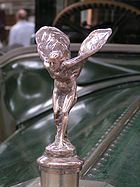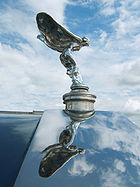The spirit of ecstasy
- The spirit of ecstasy
-
The spirit of Ecstasy

The spirit of Ecstasy : « l'esprit d'extase », sensation ressentie au volant d'une
Rolls-Royce.
L'esprit d'extase (The spirit of Ecstasy en anglais) ou the Flying Lady (la femme volante) est une célèbre statuette mascotte de la marque automobile Rolls-Royce, créée en 1911 par le célèbre sculpteur Anglais de l'époque Charles Sykes pour enjoliver tous les bouchons de radiateur de la marque.
Historique
En 1911 Lord Montagu de Beaulieu, un fan de la marque automobile Rolls-Royce, présente à Henri Royce (Charles Rolls est décédé accidentellement dans un meeting aérien l'année précédente en 1910) le célèbre sculpteur Anglais de l'époque Charles Sykes.
Ce dernier sculpte la célèbre statuette mascotte de la marque The spirit of Ecstasy ("l'esprit d'extase" en anglais : sensation ressentie au volant d'une Rolls-Royce) ou de Flying Lady (la "femme volante") pour enjoliver tous les bouchons de radiateur de la marque depuis cette date. Certaines légendes laissent croire que la statuette serait faite à l'image de la maîtresse de Henri Royce.

La Flying Lady ; une silhouette très aérienne.
Voir aussi
Sur les autres projets Wikimedia :
Liens externes
 Portail de l’histoire de l’art
Portail de l’histoire de l’art Portail de l’automobile
Portail de l’automobile Portail du Royaume-Uni
Portail du Royaume-Uni
Catégories : Sculpture (œuvre) | Rolls-Royce
Wikimedia Foundation.
2010.
Contenu soumis à la licence CC-BY-SA. Source : Article The spirit of ecstasy de Wikipédia en français (auteurs)
Regardez d'autres dictionnaires:
The spirit of Ecstasy — The Spirit of Ecstasy … Wikipédia en Français
Spirit of Ecstasy — The Spirit of Ecstasy is the name of the mascot (hood ornament) on Rolls Royce cars. It is in the form of a woman leaning forwards with her arms outstretched behind and above her. Billowing cloth running from her arms to her back resembles… … Wikipedia
Spirit of Ecstasy — Rolls Royce Kühlerfigur „Spirit of Ecstasy“ … Deutsch Wikipedia
Slain in the Spirit — Being slain in the Spirit is a term used within charismatic Christianity. It describes a religious behaviour in which an individual falls to the floor.[1] This usually happens during an event they perceive as a personal encounter with the Holy… … Wikipedia
Ecstasy (emotion) — Ecstasy is subjective experience of total involvement of the subject with an object of his or her awareness. Because total involvement with an object of our interest is not our ordinary experience since we are ordinarily aware also of other… … Wikipedia
ECSTASY — ECSTASY, from Greek ekstasis, displacement, movement outwards, distraction of mind, drunken excitement, entrancement, or secondarily, astonishment. (See Mark 5:42.) In Greek religion two fundamental types of ecstasy, dionysiac and contemplative,… … Encyclopedia of Judaism
The Birth of Tragedy — Out of the Spirit of Music … Wikipedia
Ecstasy — • Offers details of false views Catholic Encyclopedia. Kevin Knight. 2006. Ecstasy Ecstasy † … Catholic encyclopedia
Ecstasy — Ec sta*sy, n.; pl. {Ecstasies}. [F. extase, L. ecstasis, fr. Gr. ?, fr. ? to put out of place, derange; ? = ek out + ? to set, stand. See {Ex }, and {Stand}.] [Also written {extasy}.] 1. The state of being beside one s self or rapt out of one s… … The Collaborative International Dictionary of English
The Dybbuk (play) — The Dybbuk , or Between Two Worlds (Yid. דער דיבוק אדער צווישן צוויי וועלטן) is a 1914 play by S. Ansky, relating the story of a young bride possessed by a dybbuk mdash; a malicious possessing spirit, believed to be the dislocated soul of a dead… … Wikipedia
 The spirit of Ecstasy : « l'esprit d'extase », sensation ressentie au volant d'une Rolls-Royce.
The spirit of Ecstasy : « l'esprit d'extase », sensation ressentie au volant d'une Rolls-Royce.

